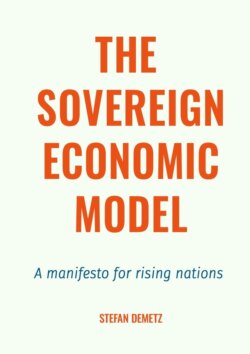Читать книгу The Sovereign Economic Model. A manifesto for rising nations - Stefan Demetz - Страница 22
State capitalism
State-Owned Enterprises as Representatives of State Capitalism
ОглавлениеMany liberal countries, despite their self-acclaimed free markets and capitalism, own several state-owned enterprises (SOEs). Examples are Amtrak rail network in the US, banks in the UK, the alcohol monopoly in Sweden, and utilities in many countries. Germany even has a state-owned beer brewery. Further, many SOEs are owned by regional or local governments and municipalities.
SOEs can have many modus operandi, depending on their political context. The tactics used, even on the internal market, may be passive and defensive or offensive and aggressive. In the first case, SOEs compete for the market share fairly, collaborating even with private businesses. In the second case, they compete aggressively and use government political power to introduce laws that benefit them, gain monopolistic positions, and push private business out of the market.
Management and governance of SOEs is a sore point. In some oil and gas exporting countries, large SOEs are mainly concerned with managing the enormous wealth of this market sector. Most are run decently or well as they are critical to state budgets. In many other fields, SOEs were, and are, badly managed. Mainly they are subjected to political tussles, run by politically appointed leaders, and used as overweight cash cows until the business environment, through heightened competition or technological changes, reduces them to a burdensome money-losing enterprise that gets privatized quickly. Relevant examples are the post offices of various countries, which have been privatized or floated on stock markets, or have suffered gargantuan losses. For instance, consider the US Postal Service (USPS), which is technically not an SOE but a special government agency, and Amtrak, the US railway operator. In monocratic government systems in Asia, SOEs fare relatively well as the governments set strict rules that administrators must follow. Deviations or political fiefdom (corruption) are harshly punished, up to death sentence. Putin’s Russia has perhaps struck the perfect «golden middle.» Many of Russia’s large SOEs, such as Gazprom (gas), RosNeft (oil), and Sberbank (banking) are traded on the stock market; the state owns slightly over 50 percent, and the rest belongs to private and minority shareholders. Therefore, the state has achieved several goals: absolute control and money along with liquidity and partial privatization. The boards and management of these companies are stuffed with foreign executives. In this way, local politicians cannot defy the shareholders’ governance and run their fiefdoms, as would be expected to happen with only local governance.
Competition or merges between SOEs is a point that needs to be analyzed. Some countries have multiple state-owned enterprises in one sector: multiple banks, multiple industries, or multiple utilities competing in a market. Sometimes it makes sense to completely merge them or to bring them under the roof of one holding group to manage them under one policy. In other instances, it is advisable to keep them separate because their core functions are different. Competition among multiple SOEs for the same customer does not make much sense because a large amount of time, financial resources, and political intrigue are spent on competition instead of on improving the offering. In these cases it is better to rationalize and merge these strikingly similar businesses. In addition, consolidation of SOEs can bring big cost savings, especially if they are large. Either a total merge or a common management as subsidiaries of a large conglomerate can make many processes and decisions much faster and highly efficient. A larger aggregated size likewise helps to fend off competition from private and foreign businesses. It also adds to the enterprise’s credibility for exporting goods and services abroad. Both China and Russia have merged and rationalized different SOEs into large conglomerates in the fields of energy and manufacturing. This makes them gain critical mass and reduces costs. Russia has merged hundreds of related firms into conglomerates in aviation, shipbuilding, engine and turbine manufacturing, and other sectors. This consolidation has allowed distributed single businesses to become increasingly productive as part of a conglomerate and work together under one umbrella to bring new products to life.
In the final analysis, well-managed state-owned enterprises can provide a stable economy and can also create growth and prosperity no less efficiently and effectively than private businesses.
